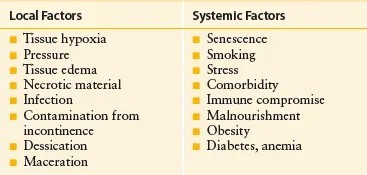What age-related factors may factor into this client's wound healing? Select all that apply.
Insulin resistance
Decreased epidermal turnover
Pigmentation changes
T-cell function decrease
Polypharmacy
Decreased subcutaneous padding
Correct Answer : B,D,F
As people age, the turnover of skin cells decreases, resulting in slower wound healing. This can prolong the healing process and increase the risk of complications.
The immune system's function, including T-cell function, tends to decline with age.
T-cells play a crucial role in the immune response and wound healing. Decreased T-cell function can impair the body's ability to fight infection and promote efficient healing.
With aging, there is a natural loss of subcutaneous fat, which can affect wound healing. Subcutaneous fat provides padding and protection to the underlying tissues, and its reduction can increase the risk of tissue damage and delays in healing.
Insulin resistance, pigmentation changes, and polypharmacy are not directly age-related factors that impact wound healing. Insulin resistance is a condition related to impaired glucose metabolism and can affect wound healing in individuals with diabetes or other metabolic disorders, but it is not necessarily an age-related factor. Pigmentation changes and polypharmacy (the use of multiple medications) may be associated with aging but do not directly affect the physiological processes involved in wound healing.

Nursing Test Bank
Naxlex Comprehensive Predictor Exams
Related Questions
Correct Answer is C
Explanation
A) Incorrect- While physical soothing can help comfort the child after the injections, it may not significantly reduce the duration of pain during the injections themselves.
B) Incorrect- Verbal reassurance is important to provide a calming environment, but it may not directly reduce the duration of pain during the injections.
C) Correct- Administering vaccines can be distressing for toddlers due to the pain associated with injections. To reduce the duration of pain and minimize the overall discomfort, the nurse should prioritize the strategy of simultaneous injections. This involves administering multiple vaccines at the same time rather than spacing them out. The rationale behind this approach is that the child experiences the discomfort of the injections only once, which can help reduce their overall distress and anxiety.
D) Incorrect- The positioning of the child may not have a direct impact on the duration of pain during injections. However, choosing an appropriate position for comfort is still important.
Correct Answer is ["25"]
Explanation
The prescription is for 1 gram of azithromycin, which is 1000 mg. The concentration of
the suspension is 200 mg per 5 mL. To calculate the amount in mL:
1000 mg / 200 mg per 5 mL = 25 mL
The nurse should administer 25 mL of the suspension.
Whether you are a student looking to ace your exams or a practicing nurse seeking to enhance your expertise , our nursing education contents will empower you with the confidence and competence to make a difference in the lives of patients and become a respected leader in the healthcare field.
Visit Naxlex, invest in your future and unlock endless possibilities with our unparalleled nursing education contents today
Report Wrong Answer on the Current Question
Do you disagree with the answer? If yes, what is your expected answer? Explain.
Kindly be descriptive with the issue you are facing.
